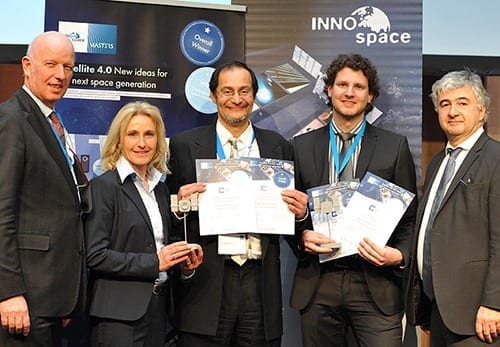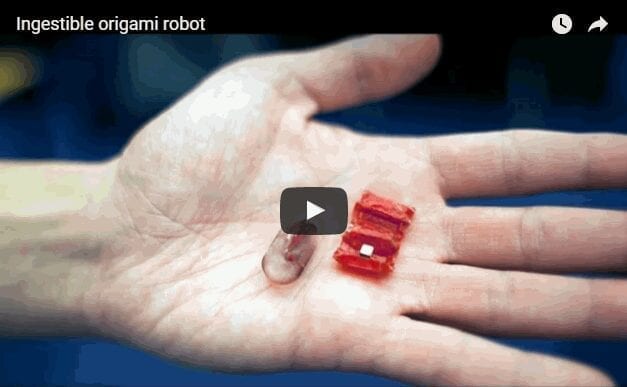
A satellite whose components are not connected through electric cables but miniaturised radio modules: This innovation has earned two computer scientists from the University of Würzburg the first place in the INNOspace Masters competition.
Professor Sergio Montenegro and his fellow researcher Tobias Mikschl have reason to be happy: A few days ago, the two computer scientists from the Julius-Maximilians-Universität (JMU) Würzburg in Bavaria, Germany, took to the podium in Berlin – as the overall winners of the INNOspace Masters competition and as winners of the category “DLR Space Administration Challenge”. DLR is the national aeronautics and space research centre of the Federal Republic of Germany.
What the price was awarded for: Montenegro and Mikschl developed Skith, a technology for the world’s first wireless satellite. Previously, all single components of a satellite had to be interconnected using electric cables. Skith has changed that by using miniaturised high-speed real-time radio modules with short ranges. This reduces design effort and costs while boosting the satellite’s technical reliability and flexibility.
Test in space planned for 2018
“The system is ready and waiting in our labs to be tested in space under real conditions,” says Mikschl. In 2018 already, Skith could hitch a ride on a satellite to be launched into space, allowing the system to prove how well it functions under real conditions.
Skith stands for “skip the harness”. As a reward for their innovation, Montenegro and Mikschl received a certificate, a satellite-shaped trophy and the invitation to apply for money with the DLR to fund new projects.
Learn more: The world’s first wireless satellite
The Latest on: Wireless satellite
[google_news title=”” keyword=”Wireless satellite” num_posts=”10″ blurb_length=”0″ show_thumb=”left”]
via Google News
The Latest on: Wireless satellite
- Best Internet Providers in Flint, Michiganon April 27, 2024 at 5:05 am
Freelance writer Amanda C. Kooser covers gadgets and tech news with a twist for CNET. When not wallowing in weird gear and iPad apps for cats, she can be found tinkering with her 1956 DeSoto. Our ...
- InterDigital Report Maps the Road to 6G, Highlighting Next-Gen Wireless Innovationson April 26, 2024 at 10:00 pm
A new industry report released by InterDigital, Inc. (Nasdaq: IDCC) paves the way for the transition from 5G-Advanced to the next frontier in wireless technology, 6G. Titled ...
- Dish Bondholders Sue Struggling Company Over Asset Transferson April 26, 2024 at 6:25 pm
Bondholders of struggling Dish Network Corp. sued the satellite-TV provider, demanding it unwind transfers that they said put valuable assets out of the hands of creditors and violated lending terms.
- Global Wireless Connectivity Market Surges Towards $345 Billion by 2032, Driven by Smart City Investments & Industrial Adoptionon April 26, 2024 at 6:09 am
The wireless connectivity market is forecasted to register a 14.1% CAGR during the forecast period (2022-2032) & is projected to reach US$ 345 Bn by 2032.
- Lynk lands US government contract for sat-to-cell serviceon April 24, 2024 at 10:31 am
Satellite direct-to-cellular service provider Lynk announced today that it has signed a five-year contract with the Defense Information Systems Agency (DISA) to enable U.S federal agencies to purchase ...
- 50 operators in 37 countries planning satellite services: GSAon April 24, 2024 at 8:53 am
GSA said that 10 telcos have commercially launched satellite services, an increase of two operators since the previous update in August 2023 ...
- Earth Day 2024: Where have AI, 5G and wireless taken us?on April 21, 2024 at 9:27 am
Earth Day has been with us since 1970. Now it is global, and, boy, how things have changed. I remember in the mid 1990s, things were very different. Back in ...
- Japanese satellite will beam solar power to Earth in 2025on April 19, 2024 at 9:00 am
LONDON — Japan is on track to beam solar power from space to Earth next year, two years after a similar feat was achieved by U.S. engineers. The development marks an important step toward a possible ...
- Businesson April 19, 2024 at 5:00 am
If Verizon, the nation’s second-largest wireless provider has its way, customers won’t ever experience a widespread network outage.
- Huawei's Pura 70 line: a retractable lens on the Ultra, variable aperture and satellite connectivity on the base modelson April 18, 2024 at 12:29 am
On the Pura 70 Ultra, there is something that will make tech-savvy mobile photographers drool: a mechanical telescopic (not periscope!) lens structure capable of internal expansion and contraction!
via Bing News










